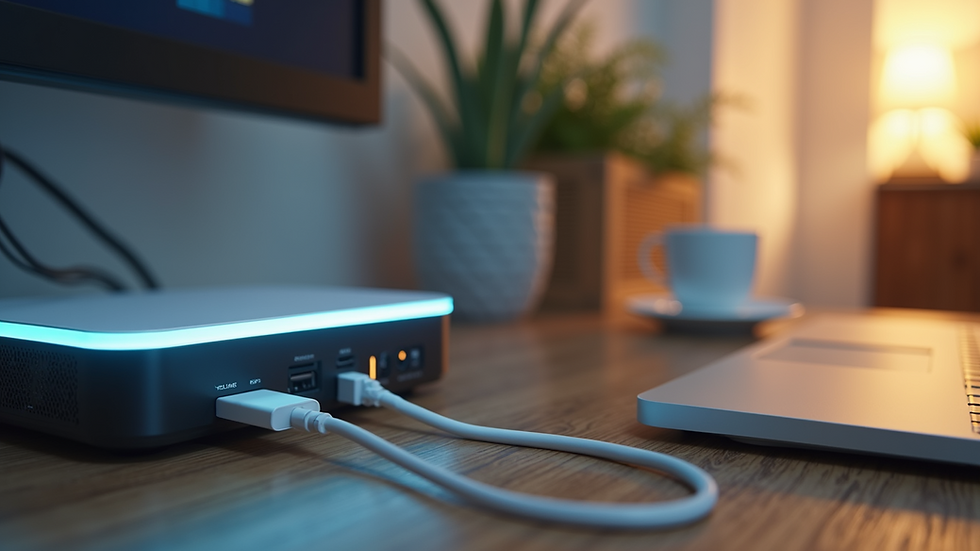Unveiling the Top 5 Smart Electronics Every Consumer Product Manager Must Master
- Gulshan Sharma
- Jul 28, 2025
- 3 min read
In the dynamic marketplace we live in today, consumer product managers face countless challenges and rapid changes. The rise of smart electronics has transformed how products are designed, marketed, and used. By mastering specific smart technologies, product managers can gain a vital competitive edge. Here are the top five smart electronics that every product manager should become proficient in to innovate and maintain relevance.
1. Smart Home Devices
Smart home devices have redefined the way consumers interact with their homes. Take smart speakers like Amazon Echo or Google Nest, which not only play music but also manage home security systems and control lighting. According to a 2022 report by Statista, the number of smart home devices is projected to reach over 1.4 billion worldwide by 2025.
Understanding the integration and personalization that consumers demand from these devices can significantly guide product development and marketing strategies. For instance, data from smart home devices shows that 75% of consumers prefer products that work seamlessly with others they already own. This kind of insight is critical for product managers aiming to foster compatibility across their brands.

Being well-versed in the smart home ecosystem helps product managers nurture existing tech trends while predicting shifts in consumer behavior.
2. Wearable Technology
Wearable technology is on the rise, especially with devices like smartwatches and fitness trackers. A study by Pew Research found that 28% of Americans own a smartwatch, and their capabilities have expanded beyond simple health monitoring. They can now track heart rates, monitor sleep patterns, answer calls, and process payments via platforms like Apple Pay or Google Wallet.
Product managers should focus on the behavioral data these wearables provide. This data reveals how users interact with technology daily, influencing product designs and targeted marketing efforts. For instance, in 2022, users of fitness trackers were found to exhibit a 30% higher motivation in maintaining an active lifestyle, a trend savvy product managers can leverage in their strategies.
3. Augmented Reality (AR) Devices
Augmented reality is no longer just a futuristic concept; it has become a necessary tool for consumer engagement. Devices such as smart glasses and AR-enabled mobile applications have surged in popularity. In the retail sector, AR allows customers to visualize products in their spaces before a purchase, simplifying decision-making.
For example, IKEA's AR app allows users to see how furniture would look in their homes, leading to a 94% increase in consumer confidence in purchasing decisions. Product managers who can incorporate AR features in their products can create more engaging and interactive experiences, thereby boosting sales and customer loyalty.

As AR technology becomes more sophisticated, product managers who embrace it can differentiate their brands in a crowded market.
4. Smart Appliances
Smart appliances are changing how consumers approach everyday tasks. Refrigerators with built-in cameras that track inventory and ovens that can be preheated from a smartphone app exemplify how technology enhances convenience. Statistics show that 45% of consumers are interested in smart kitchen appliances due to their energy-efficient features.
For product managers, staying informed about smart appliance trends is vital. As more consumers prioritize sustainability and convenience, knowledge of these emerging technologies enables managers to design products that cater to evolving preferences.
5. Robotics and Automation
Robotics and automation have expanded beyond industrial settings, finding their way into home life through products like robotic vacuums and lawn mowers. The global market for consumer robotics is expected to reach $6.47 billion by 2026. Product managers need to recognize the shift towards smart automation as it reshapes consumer expectations.
However, it is essential to address consumer concerns about job displacement and privacy actively. Transparent communication about how these technologies work and the benefits they provide can enhance trust and build long-lasting customer relationships.
Embracing the Future of Smart Electronics
Navigating the world of smart electronics may seem daunting, but understanding these top five devices is crucial for every consumer product manager. From smart home technology to robotics, each category presents unique challenges and opportunities for growth.
Mastering these devices not only strengthens product offerings but also allows for creating solutions that resonate with today's consumers. In an age where technology keeps evolving rapidly, staying knowledgeable and adaptable is essential for success.
Incorporating smart electronics into product strategy is not just a good idea; it has become an absolute necessity. Equip yourself with this knowledge, engage with emerging technologies, and drive innovation in your products. The future of consumer goods is deeply intertwined with smart electronics, and now is the time to embrace this exciting change.
Join our exclusive community and get multiple benefits, including early access to our beta AI solutions for this industry - https://forms.gle/igbhGxChxkXCiMqKA
For end-to-end electronics development and manufacturing services - Hardware Development, Firmware Development, Rapid Prototyping, BOM procurement, PCB fabrication and assembly, Turnkey Manufacturing, please get in touch - gulshan@xelec.in




Comments